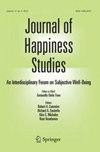超越倾向性乐观主义和悲观主义:生活意义的三方模型在预测成年人未来福祉方
乐观主义:提升幸福感的心理倾向 #生活乐趣# #心理学知识#
引用次数: 0
摘要
本研究旨在确定性格乐观/悲观主义和人生意义三方模型的各个方面(即理解、目的、& 重要性)是否是 166 名成年人后续幸福感(3 个月后评估)的重要且相加的前瞻性预测因素。分层回归分析的结果表明,乐观情绪的存在(而非悲观情绪的缺失)能够持续预测随后的积极情绪、生活满意度和主观幸福感。此外,除了未来预期所带来的变异之外,理解力还能预测生活满意度,而目的则能预测积极情感。我们还发现,"朦胧感 "可以预测主观幸福感,但对积极情感的预测作用较弱。总之,这些研究结果不仅表明,乐观情绪的存在对于成年人体验未来幸福感非常重要,而且还进一步阐明了生活意义的哪些具体方面在促进成年人未来幸福感方面也发挥着重要的叠加作用。
本文章由计算机程序翻译,如有差异,请以英文原文为准。
Beyond Dispositional Optimism and Pessimism: Does the Tripartite Model of Meaning in Life Matter in Predicting Future Well-Being in Adults?
The present study sought to determine if dispositional optimism/pessimism and facets of the tripartite model of meaning in life (viz., comprehension, purpose, & mattering) represent important and additive prospective predictors of subsequent well-being (assessed 3 months later) in 166 adults. Results from hierarchical regression analyses indicated that the presence of optimism, but not the absence of pessimism, consistently predicted subsequent positive affect, life satisfaction, and subjective happiness. Moreover, beyond the variance accounted for by future expectancies, comprehension was found to predict life satisfaction, whereas purpose was found to predict positive affect. Mattering was found to predict subjective happiness and, to a weaker extent, positive affect. Overall, these findings not only indicate that the presence of optimism is important for experiencing future well-being in adults, but they go further to clarify which specific facets of meaning in life also play an important additive role in contributing to future well-being in adults.
求助全文
通过发布文献求助,成功后即可免费获取论文全文。 去求助
相关文献
二甲双胍通过HDAC6和FoxO3a转录调控肌肉生长抑制素诱导肌肉萎缩
Min Ju Kang, Ji Wook Moon, Jung Ok Lee, Ji Hae Kim, Eun Jeong Jung, Su Jin Kim, Joo Yeon Oh, Sang Woo Wu, Pu Reum Lee, Sun Hwa Park, Hyeon Soo Kim
具有疾病敏感单倍型的非亲属供体脐带血移植后的1型糖尿病
Kensuke Matsumoto, Taisuke Matsuyama, Ritsu Sumiyoshi, Matsuo Takuji, Tadashi Yamamoto, Ryosuke Shirasaki, Haruko Tashiro
来源期刊

CiteScore
8.60
自引率
6.50%
发文量
110
期刊介绍: The international peer-reviewed Journal of Happiness Studies is devoted to theoretical and applied advancements in all areas of well-being research. It covers topics referring to both the hedonic and eudaimonic perspectives characterizing well-being studies. The former includes the investigation of cognitive dimensions such as satisfaction with life, and positive affect and emotions. The latter includes the study of constructs and processes related to optimal psychological functioning, such as meaning and purpose in life, character strengths, personal growth, resilience, optimism, hope, and self-determination. In addition to contributions on appraisal of life-as-a-whole, the journal accepts papers investigating these topics in relation to specific domains, such as family, education, physical and mental health, and work. The journal welcomes high-quality theoretical and empirical submissions in the fields of economics, psychology and sociology, as well as contributions from researchers in the domains of education, medicine, philosophy and other related fields. The Journal of Happiness Studies provides a forum for three main areas in happiness research: 1) theoretical conceptualizations of well-being, happiness and the good life; 2) empirical investigation of well-being and happiness in different populations, contexts and cultures; 3) methodological advancements and development of new assessment instruments. The journal addresses the conceptualization, operationalization and measurement of happiness and well-being dimensions, as well as the individual, socio-economic and cultural factors that may interact with them as determinants or outcomes. Central Questions include, but are not limited to: Conceptualization: What meanings are denoted by terms like happiness and well-being? How do these fit in with broader conceptions of the good life? Operationalization and Measurement: Which methods can be used to assess how people feel about life? How to operationalize a new construct or an understudied dimension in the well-being domain? What are the best measures for investigating specific well-being related constructs and dimensions? Prevalence and causality Do individuals belonging to different populations and cultures vary in their well-being ratings? How does individual well-being relate to social and economic phenomena (characteristics, circumstances, behavior, events, and policies)? What are the personal, social and economic determinants and causes of individual well-being dimensions? Evaluation: What are the consequences of well-being for individual development and socio-economic progress? Are individual happiness and well-being worthwhile goals for governments and policy makers? Does well-being represent a useful parameter to orient planning in physical and mental healthcare, and in public health? Interdisciplinary studies: How has the study of happiness developed within and across disciplines? Can we link philosophical thought and empirical research? What are the biological correlates of well-being dimensions?
期刊最新文献
Does Homeownership Improve Household Well-Being? A Case Study from Togo Creating Kinship with Nature and Boosting Well-Being: Testing Two Novel Character Strengths-Based Nature Connectedness Interventions Sociodemographic Disparities in Positive Life Experiences Flow and Abiding Interest: An Experiential Perspective on Identity Maintenance and Development in Later Life Affirming the Less Defended Self: Quiet Ego Reminders Reduce Implicit Self-Other Bias
网址:超越倾向性乐观主义和悲观主义:生活意义的三方模型在预测成年人未来福祉方 https://www.yuejiaxmz.com/news/view/1142377
相关内容
悲观主义与乐观主义知乎悲观主义和乐观主义的区别是什么
乐观主义和悲观主义的区别
悲观主义世界里乐观的活着
乐观的悲观主义:拥抱黑暗,期待光明
悲观式乐观主义
技术哲学(乐观主义和悲观主义)
1技术哲学(技术乐观主义和技术悲观主义)
乐观的悲观主义者的区别
人生哲理语句 悲观主义者与乐观主义者

